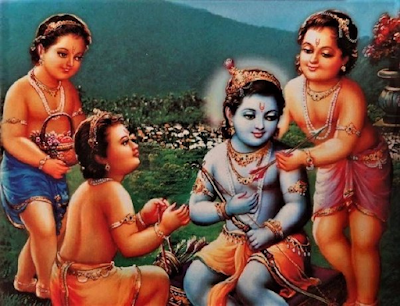Shatrughna stood in front of all the elders, with a bowed head and folded hands.
“Please grant me too your blessings,” he requested softly.
“Why? Where are you off to?” demanded the Guru.
“I’m accompanying Bharata on his journey.”
“But we have not taken you into consideration while finding the auspicious day for travel! Today was a good day as per Bharata’s horoscope. Now, if you are going along, we will have to check the charts to see if today is the right time for you to travel!”
In a soft voice full of conviction, Shatrughna replied.
“With all due respects to the Guru, I would like to ask if the rules demand that a prince check the horoscope of the luggage he carries along on the journey?”
Everyone was confused, but Guru Vasistha nodded his approval and let young Shatrughna proceed with Bharata on the journey.
Such was the humility of Shatrughna that he considered himself as nothing more than a piece of luggage that would accompany Bharata!!
"GacchatA mAtula kulam BharatEna saha anagha:
ShatrughnO nitya ShatrughnO neeta: preeti puraskrita:" In this shloka, Sage Valmiki says that Shatrughna was “taken” by Bharata to his maternal uncle’s kingdom, and it gives us a glimpse into how completely the younger brother had surrendered to the elder one, that he was no more an entity than a piece of luggage in the entourage traveling with Bharata!
When Bharata brought the padukas of Lord Rama, and installed them at Nandigram, refusing to enter Ayodhya till his brother returned from vanavaasa, it was the devout Shatrughna who managed all the activities of administration and took care of the welfare of the mothers, on behalf of Bharata.
The Srivaishnava acharyas draw our attention to how, if Lakshmana was steeped in “Bhagavad-bhakti” (devotion to Lord Rama), Shatrughna was immersed in “Bhaagavata-bhakti” (devotion to the Lord’s devotee, Bharata).
The name Shatrughna indicates that he was a destroyer of enemies. Sure, Rama and Lakshmana destroyed many rakshasas, but except for one Lavanasura, there is no description of any other enemies killed by Shatrughna. Then why this name for him?
The aachaaryaas explain that this was because he had destroyed those dangerous inner enemies – kaama, krodha, lobha, moha, madha and maatsarya – the six foes of lust, anger, greed, attachment, pride and jealousy.
The shloka mentioned above also refers to Shatrughna as “anagha” – the one without a blemish. The aachaaryaas explain that this indicates that he was free from the fault of “Raama-bhakti”!
Isn’t it blasphemous to say so?
No, comes the vociferous reply from the aachaaryaas. Shatrughna’s whole life revolved around service to Bharata – service of the Lord’s devotee. In this scenario, “Bhagavad-bhakti” would be an unnecessary diversion that would interfere in his performance of “Bhaagavata-bhakti”.
The Lord is full of divine qualities. Serving Him and practising devotion to Him is therefore not very difficult. But the devotee of the Lord, who is as human as you and me, being able to serve him is not as easy and therefore, truly a test of our devotion.
Can we try to inculcate the spirit of Shatrughna, work on destroying our inner enemies, and try to be of service to those who are bhaktas of the Lord?





